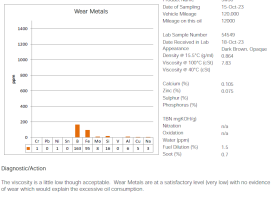Seeing as there's so many knowledgeable people on here, I'd like some of you to glance over my Millers results please.
My 204 has been using a heap of oil so I was already convinced the engine is toast, until last week the turbo packed up and after talking to the AA guy and my garage it's possible the oil usage and pretty much continuous regen could be caused by the faulty turbo and therefore clogged DPF, and the engine could be fine?!
View attachment 218372
Fuel dilution acceptable limit is 2% so I would get the oil and filter changed asap (if it were still running).
You have 12000 miles entered as the oil mileage at the time of sample, is this correct? Seems odd to have such a round number.
Without higher iron and alum’ content it would indicate that the turbocharger/s were the route cause of the oil consumption and the fuel dilution being caused by frequent regenerations.
Obviously the van requires a turbocharger assembly replacement, probably a new exhaust manifold as the new turbo’ ass'y is modified, new EGR pipe to EGR as different exh’ manifold. I think you can safely say that the EGR is toast given the mileage and how much soot has passed through it.
You may be able to back flush the charge air cooler if there are unaccounted turbo’ parts missing, either way it’s worth de-greasing, many mechanics would renew it as any lodged debris could be ingested after rebuild.
Sump needs to be dropped to clean the oil screen and prove the turbo’ oil drain.
Turbo’ oil feed needs to be checked.
It’s expensive but not as bad as it could have been.
IMO and that’s all it is; the poor DPF condition is probably the route cause of the rash of 204ps engine failures; unsuccessful re-gen’s causing fuel dilution, causing bore wash causing cylinder / piston ring wear. Cylinder / piston ring wear increasing blow-by increasing crankcase pressure possibly to a rate where the PCV cannot cope and feeds oil vapour back into the induction creating more soot. Increased crankcase pressure acts against the turbo’ oil feed drain, reducing oil flow and increasing turbo’ temperature.
Blocked DPF causing raised exhaust back pressure acting against turbo’ oil feed pressure reduces oil flow and raises turbo’ temperature.
Oil analysis and DPF monitoring is key to reliability in my opinion and costs peanuts in comparison to the alternative.
EDIT: while the sump is off it is possible to do a visual inspection of the cylinders to determine if they are damaged. Not 100% conclusive but will indicate if you need to go further. You could also do a compression test prior to stripping.




